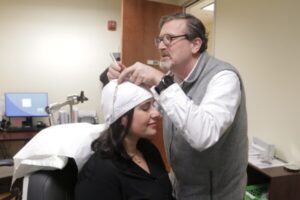Interventional Psychiatry
 Recent advances in pharmacology and neuromodulation have led to the development of novel treatments for neuropsychiatric disorders. These highly specialized interventions are now called Interventional Psychiatry services. The UNC Department of Psychiatry currently provides Interventional Psychiatry services to patients, including Intranasal Esketamine (Spravato), Brexanolone Infusion, and Transcranial Magnetic Stimulation (TMS). These new therapies treatments complement more established treatments such as Electroconvulsive Therapy (ECT) and Deep Brain Stimulation (DBS).
Recent advances in pharmacology and neuromodulation have led to the development of novel treatments for neuropsychiatric disorders. These highly specialized interventions are now called Interventional Psychiatry services. The UNC Department of Psychiatry currently provides Interventional Psychiatry services to patients, including Intranasal Esketamine (Spravato), Brexanolone Infusion, and Transcranial Magnetic Stimulation (TMS). These new therapies treatments complement more established treatments such as Electroconvulsive Therapy (ECT) and Deep Brain Stimulation (DBS).
Intranasal Esketamine (Spravato)
Esketamine is a rapidly acting intervention for the management of TRD (treatment-resistant depression) in adults. This latest development emerged from the clinical studies of ketamine infusion therapy conducted since 2000 by clinicians and scientists. UNC providers treated patients in the research studies of safety and effective leading to FDA-approval of intranasal esketamine.
Brexanolone
Brexanalone Infusion is a rapidly acting intravenous therapy, the first treatment approved by the FDA for Post-Partum Depression. UNC providers with collaborators conducted the seminal safety and efficacy studies that led to its widespread use.
Transcranial Magnetic Stimulation (TMS)
TMS is a neuromodulation treatment for Major Depressive Disorder. A strong magnetic field is applied in order to stimulate electrical activity in the Prefrontal Cortex (PFC). This neurostimulation positively affects the interconnected brain areas altered in Major Depression. Three to twenty minute long TMS treatments occur five times per week per week for four to six weeks. Unlike antidepressant medications, TMS has no systemic side effects.
Electroconvulsive Therapy (ECT)
ECT is a safe, effective treatment for refractory depression, psychosis and catatonia. ECT require general anesthesia and repeated treatments. The side effects are well described.
Deep Brain Stimulation (DBS)
DBS has an FDA compassionate use indication for treatment-refractory Obsessive-Compulsive Disorder (OCD). It is conducted as an IRB-approved research study by collaborators from the UNC Departments of Neurosurgery, Neurology and Psychiatry.
